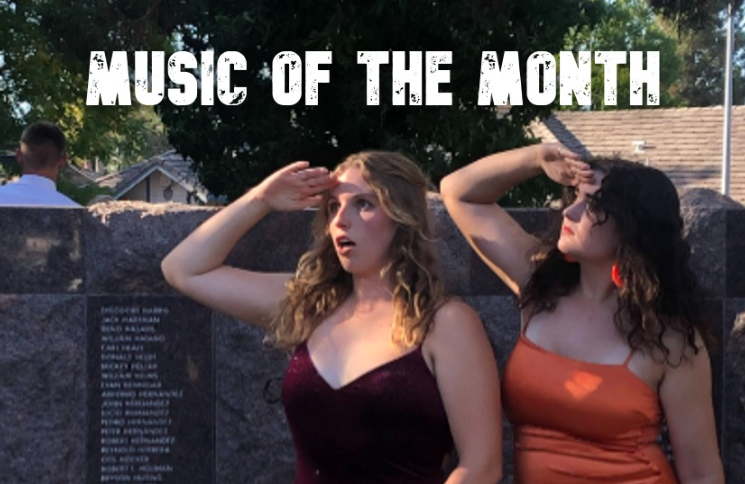It’s September! While midterms are just around the corner, we’ve been branching out to new artists and genres but continue to come back to our favorites. As always, we hope you enjoy this edition of Music of the Month!
Cali’s Picks
“Staring Out the Window at Your Old Apartment” by Jeff Rosenstock, “WORRY.” (2016)
Deriving from the critically acclaimed “last great punk pop album,” “Staring Out the Window at Your Old Apartment” is an eclectic staple that culminates feelings of melancholy and lost love over catchy riffs and organ chords. The ditty kicks off with peppy organ notes that are quickly joined by Jeff Rosenstock’s cacophonic wail that describes the new view of his significant other’s apartment now that they’re gone and out of his life. As an electric guitar slides in, the organ dissipates and the anthemic chorus takes its place. Rosenstock fills the listener with a sense of dread through the repetition of “You don’t know where to go/You’ve got nowhere to go” after each chorus. During the bridge, the energy of the composition comes to a peak as Rosenstock screams each line with emotional gusto as the feedback-riddled guitars euphorically accompany him. The track fizzles out with a few repetitions of the chorus and an abrupt stop. Carrying some of the central themes of the album, “Staring Out the Window at Your Old Apartment” is a standout track that any pop punk fan should be familiar with due to its raw emotional power and strong instrumentals.
“The Background” by Third Eye Blind, “Third Eye Blind” (1997)
A somber cut from Third Eye Blind’s breakout self-titled debut album, “The Background” is a beautifully heart-wrenching number that puts the listener in the narrator’s perspective courtesy of delicate guitars, descriptive lyrics, and a dynamic structure. Initially, the isolated guitars in a heavier Open D tuning take prominence, beginning in a distorted fashion until a triad-based lick sends the track into the first verse. Each verse begins in a quiet fashion before gradually growing louder with each line. This slow buildup sets up anthemic choruses that highlight Stephan Jenkins’ strong vocal prowess before fading back into the muffled intro riff. Nearly all of the energy of the composition is channeled during the bridge section where Kevin Cadogan and Jenkins’ guitars blissfully peak after an impressive solo delivered by Cadogan. Following this bridge, the band transitions into the final chorus and the nearly silent outro that consists of a few measures of soft power chords and a deafening silence.
“Since U Been Gone” by A Day To Remember, “For Those Who Have Heart” (2007)
Greatly contrasting the original composition by Kelly Clarkson, A Day To Remember puts a metal twist on the pop mega-hit while maintaining the same lyrics and structure. The composition begins in the same guitar sequence as the original, however the track is more distorted with a dropped tuning. The verses are very poppy with a simplistic drumbeat courtesy of Alex Shelnutt with Jeremy McKinnon’s softer vocals feathering over them. However, the energy of the track picks up in the chorus with raucous vocals and a full-blown hard rock ensemble of power chords and pounding drums. Contrasting the first verse, McKinnon screams the latter half of the second verse as the number pummels into the second chorus and riveting bridge. Following the final chorus, the track ends with a shift from eccentric to somber as the number fades out with a final coo of “Since you been gone” and a sudden instrumental ending.
Brianna’s Picks
“Not The Same Anymore” by the Strokes, “The New Abnormal” (2020)
The melancholic reflection in “Not the Same Anymore” on the indie band’s sixth studio album stands with a deeply introspective and personal connotation. Emotion pours from each feature of the track. Between the opening hi-hat that leads into the crashing of the symbol, to the smoothness of the bass, and the desperation heard through the quality of Julian Casablancas vocals, “Not the Same Anymore” is one of the most tear-jerking tracks off of “The New Abnormal.” The track heavily relies on the drumming of Fabrizio Moretti to drive the track from the exploding opening to the enveloping outro. To accompany Moretti’s beat, the rhythm guitar lines synchronize to provide an even stronger backbone for the track. This effect is more notable during the verses. Despite the pensive feeling the track gives, “Not the Same Anymore” is presented with significantly more beats per minute in reference to the rest of the album. As the track concludes, the listener is left to ponder on the song while a glitchy guitar consumes the first half of the outro, leaving warm yet suffocating instrumentation.
“The Wanton Song” by Led Zeppelin, “Physical Graffiti” (1975)
“The Wanton Song” is one of those songs that showcases everything that makes Led Zeppelin ‘Led Zeppelin.’ The track opens into a repetitious riff with Jimmy Page’s iconic guitar tone. The song was later featured on Led Zeppelin’s deluxe edition of their first compilation album “Coda” (1982) under the name “Desire (The Wanton Song).” The audio engineers working with the band during the early sessions heavily disliked Page’s added effect, which is the contributing reason why “The Wanton Song” is one of 23 songs to be featured on the compilation album of rejected tracks. The effect can be heard following the first verse, providing a more discounted, spacious tonality. The same bridge appears later in the song following the second verse however the second bridge takes the listener into the guitar solo which was transitioned into by Robert Plant’s vocalise. Page’s sharpness in the solo is imperative to the essence of Led Zeppelin. The main riff of the track relies on two notes, spaced between an octave. Page is also seen implementing reverse reverb and running his guitar through a Leslie speaker, creating a much bigger sound that the band required to meet their standards. “The Wanton Song” is an additional track within Led Zeppelin’s discography functioning as a cohesive unit.
“Sometimes I Think About” by The Blue Magoos, “Psychedelic Lollipop” (1966)
The innovative guitar balanced by the falling bass forces the Blue Magoos to the forefront of the psychedelic trend. The seventh track on the album offers an alluring tonality through descending notes of Emil Thielhelm’s vocals. The building tension throughout the extensive solo makes way for the descent of the verse. The outro contains aggression that is more interpreted as yearning. “Sometimes I Think About” is an ideal track that expresses that longing feeling, a search for a distant memory. The song concludes with a hard hitting section at the hands of the swelling instrumentation, contrasting the melancholic intro that was reliant on the shining guitar, walking bass, and chiming percussion.










